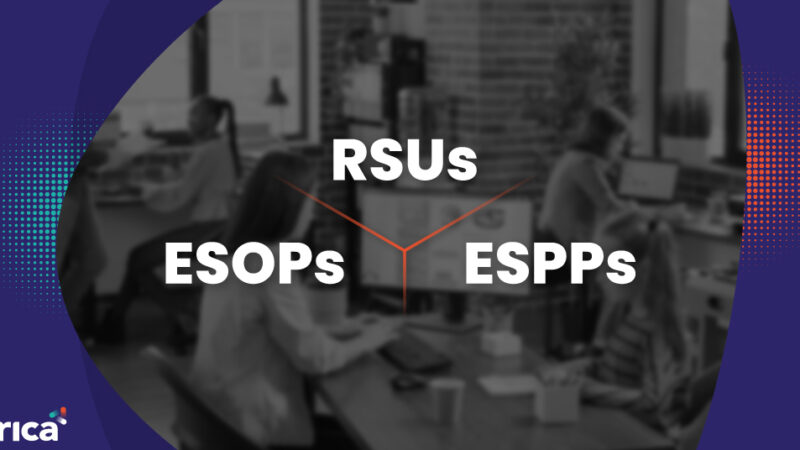
How Does Equity Compensation Combat Rising Inflation and Salary Increase Demands
The precarious state of the labor market has been rendered all the more fragile by the lasting effects of the pandemic. Fueling the downward trajectory, the Russia-Ukraine war has exacerbated the economic conditions worldwide. With rising inflation, higher volatility, lack of liquidity, supply-chain disruptions, a risk of stagflation and an imminent recession seem undeniable.
With the rise in inflation, salary hikes are being expected by employees everywhere. The CPI (Consumer Price Index) has been on the rise and employers are in a catch. With reduced liquidity and rising demands, retaining the talent without creating a hole in the budget seems to be a major challenge.
We take you through how inflation and the demand for pay hikes have reciprocal effects on each other and how companies are navigating through this.
How are Salary Demands and Inflation Linked?
Inflation acts as an indicator of pay trends since increasing prices trigger the need for higher wages to meet these rising costs. Inflation undermines the buying power of the common worker and greatly impacts production.
However, this cyclical relationship of increase in inflation that signals compensatory pay hikes has the ability to severely impact the economy. Furthermore, on a micro-level, businesses suffer in terms of profitability, given that acquiescing to salary increases entail a large outgoing cash flow. And, amid a funding winter and reduced cash availability, prioritizing profitability is paramount. While companies are budgeting to tackle the current economic conditions, salary hikes would become a recurring burden.
It is for this reason that companies choose to tie pay increments to performance and make the choice to give preference to equity as a tool for compensation.
What does Equity Compensation Entail & Why is it Sustainable?
Equity compensation is non-cash pay in the form of company stocks that is given to employees. This could be in the form of restricted stock units (RSUs), stock appreciation rights (SARs), stock options (ESOPs), performance stocks, etc.
This form of compensation is usually accompanied by a below market-value salary but is advantageous since it offers employees a stake in the company ownership. Aside from providing businesses some relief in cash flow losses, equity compensation has proven to be effective in motivating employees to stick around longer, as well as to perform better.
Of course, non-monetary benefits offered instead of hard cash may be a hard sell, but this is where company policy and culture make a difference. If company culture sufficiently substantiates the potential future value of a generous equity-based incentive plan, it automatically becomes a more attractive offer for employees.
Having tangible ownership in the companies they work for helps foster the feeling of “connectedness” among employees. In fact, the combination of concrete personal and financial investments in a business means that employees are more likely to stay longer at a company. It’s a calculated risk that employees willingly take when they wait out their vesting periods, hoping for significant gains as the company grows.
Take, for instance, the case of The Cheesecake Factory – one of Fortune 500’s top 100 companies to work for – and one of the few foodservice sector players to offer equity to employees. A wise decision since equity compensation was a critical factor in retaining senior staff such as restaurant managers, most of whom saw their 5-year vesting period through. Moreover, employee polls indicate that an overwhelming 92% of employees are satisfied with the compensatory structure.
Of course, no compensatory tool is without its motives to maximize company benefit. Businesses cannot pursue altruism to the peak – their primary function is to make money and save money while doing so. Equity compensation is a great way to do this since it’s a cost-effective method to retain dedicated employees without doling out the cash. In fact, employer contributions to equity plans (stock ownership, dividend payments, etc.) are all tax-deductible.
These targeted pay adjustments and raises are made keeping individual performance, company finances and needs, and competitiveness of pay in mind. Indeed, simply changing the structure of value propositions and pay packages will not counter inflation overnight but can significantly improve employee investment health and options.
Non-monetary compensation in the form of equity seems to be a sustainable solution that meets employee demands and also provides a long-term tool with which employees can combat price hikes.
Final Thoughts
The idea of equity compensation certainly benefits companies when it comes to structuring pay packages, but is an equally significant value-add for employees. Awarding company ownership as a part of pay is a show of confidence in both the business and the employee. It is a promise of financial enhancement in the future.
Correctly handling equity distribution is key to ensuring the success of many startups, and creating an equity scheme that suits a business is a key step. Managing equity efficiently is what will hold it all together and drive up retention rates. This can be overwhelming for businesses, especially if they’re in the midst of losing employees quickly.
Having an uncluttered, transparent view of finances and employee ownership is critical in maximizing rewards for everyone involved. A seamlessly integrated equity management platform will help to strategically incentivize talent. This is where trica equity fits in. Try out our software and digitize and customize your cap table as your company grows. Book a demo today!
ESOP & CAP Table
Management simplified
Get started for free





